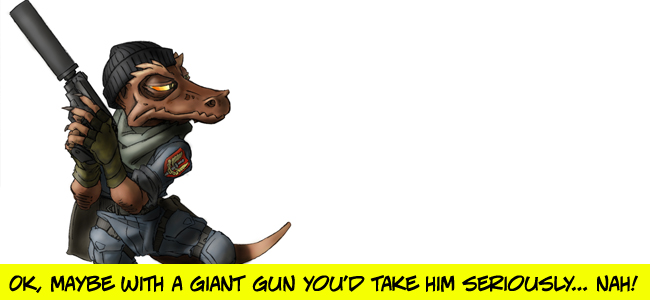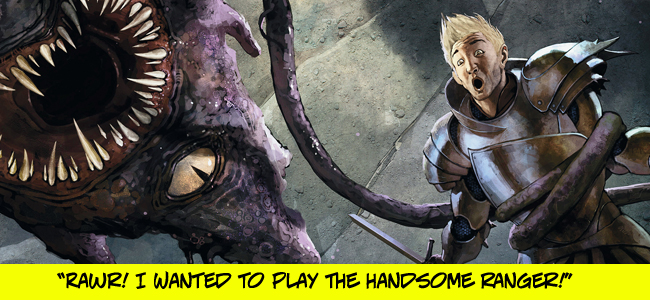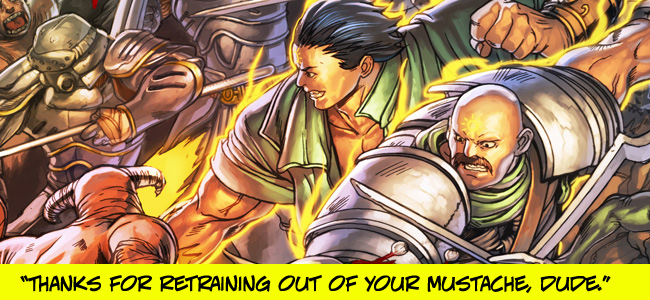![]()
One of the first lessons game masters learn is to be flexible. Whether it’s by observing a more experienced GM say ‘yes’ at all the right moments, or by doing some soul-searching after watching the collapse of their fourth campaign in as many months. All game masters learn flexibility eventually. Most gamers will agree that a game master who is willing to let players push the boundaries of their game makes for a better gaming experience.
But how flexible should the players be?
Surprisingly, the answer is ‘a lot’ although most players make subconscious allowances all the time. For example if your game master pitches a game set in the Talenta Plains most players will say, “OK”, crack open their Eberron Player’s Guide and set out to make some dinosaur-riding halflings. It is rare to have a player respond “No, I want to play a gritty police procedural” and to leave the table if he doesn’t get his way.
Which leads us to the only times where player flexibility, or more precisely the lack of it, becomes an issue in games. What follows are the two major examples that illustrate inflexible behavior at character creation and during play, along with some advice on dealing with it.
Your Character Doesn’t Fit The Game
A role-playing game, like any fictional story needs to have limits and boundaries to its themes. This doesn’t change even if every potential rules option and character concept is allowed into the game. There are always going to be certain themes that the game master will want to bring to the fore. Other themes he will want to downplay. Sometimes players have trouble perceiving this, and often game masters have trouble communicating it, so you end up with a character that really doesn’t match the rest of the universe. Now, I don’t mean a fish-out-of water type. That has role-playing potential. I mean out of place in the metacontextual sense. For example, a hardened killer in a party of optimistic teenage adventurers. Or any character who has other concerns besides the plot lines the game master and other players want to pursue. This can also be a question of tone. If you are playing a four-color heroic type in a party of scumbags you are likely in for a rude awakening.
Here’s an example: A friend of mine ran an all-Kobold D&D game a few years ago. For those of you not familiar, kobolds are odious dog-lizard-people and really obnoxious, early-campaign monsters. Immediately everyone realized that this was meant to be a humorous game and the tone was crafted into something akin to a zany Saturday morning cartoon. And then, as the party tried to sneak through a human village, one of the PCs found a baby in a crib… AND ATE IT!
Now, Kobolds are, as I mentioned before, pretty terrible little critters. It would make sense for a GM to try to emphasize this. When she describes Kobold raids to a party of normal adventurers she might include rumors that they steal and eat human babies. But in this case, as the protagonists of a comedic adventure it completely clashed with everybody’s perception of the game, even the GM’s. In the end the player said that he was ok retconing it, and we did. Which was a good example of A) misreading the tone of a game and B) being flexible when it becomes clear that the change in tone would be harmful to the game.

So what should you, as a player, do when your character doesn’t match the game? The answer is simple: change.
Is the game master constantly at a loss as to what to do with you? Do the other characters blow off your character? Do the other players break character constantly to talk to you about your character’s behavior? And most importantly, does it seem like you’re the only one this happens to? Then chances are you need to change your character for the sake of the game. Talk with your game master about what he wants out of a party member. Make sure you pay special attention to issues of tone and scope, if your character is hunting for something beyond the scope of the game it will be difficult for him to deal with the plots at hand.
And most importantly, don’t take it personal. Your fellow gamers need your character to change in order to have a good time. They’re not being hostile, they’re not being selfish, and they’re not doing this to spite you. Just tweak your character, or make a new one that better matches the game’s tone. You will save yourself a ton of grief.
Your Concept Invalidates My Concept
Also his younger, louder brother, your stats invalidate my stats. This one’s a hard one. I’ve had the opportunity to observe a handful of situations like this recently and they really throw people for a loop. I think the main problem comes from two assumptions that people make when they play:
- I can make whatever character I want (and play him however I want)
- My concept is just as valid as any other concept.
You might look at those and think they’re are basically the same thing, right? They’re certainly related, but sometimes they can conflict. What happens when you pitch a brooding loner with a dark past and your buddy also pitches a brooding loner with a dark past? Can you really have two wolverines in a party? Doesn’t one invalidate the other? Here’s another example:
One player, we’ll call him “Anton”, is going to play in a mid-level D&D game. He comes up with a concept for a fighter who is seeking to redeem his family name, his father was framed for treason and his lands were seized. Now armed only with the family’s ancestral sword this young man seeks the people responsible for his father’s downfall. He decides that his family’s crest has some wolves on it, because wolves are awesome. He decides that they’re from the northern reaches of the kingdom, where it is almost always cold. He looks through the book and finds a frost greatsword, which, awesomely, is right within his starting-character budget to get. He decides the blade will have an awesome name like Frostbrand or Winterfang and that it was forged by frost giants in a mystic forge that has never known warmth.

So he shows up to play and his good friend Lewis has made a barbarian who can totally rage a bunch of times per day and is awesome, also he picked the exact same sword as Anton.
So what should Anton do? The Blade of Bleakwinter has become intrinsic to his concept, but obviously as soon as Lewis’ character breaks out his own completely identical sword that’s going to water down the awesomeness of it.
Now, if you’re a game master the gears in your head are already turning trying to figure out ways to mediate this potential conflict. (And yes I do realize that this is a third permutation: Your Stats Invalidate my Concept) but the fact of the matter is one of the two players is going to have to back down. Granted, you could come up with some awesome storyline about the blades being forged together, but that’s already a retcon of Anton’s backstory. You could ask Lewis to pick a different sword, but doesn’t he have the right to have that sword? Isn’t every character just as valid as any other character?
Sure, in theory, but in reality something has to give. This is why it’s important to be flexible as a player. When you make a character for a game you have to keep the concept somewhat malleable, not just to fit with the game master’s world, but also to fit with the rest of the party. This can apply to any part of the character, I can’t even remember how many times I walked into a game thinking “I’m totally going to play this guy like a pompous jerk with a heart of gold” only to start the game and see that there were at least two of those in the party already.
So which of the two players should back down in the aforementioned example? Ideally both. Or rather, both should be prepared to back down. Anton could write a different weapon into his story or even change his story completely to accommodate a new weapon. And of course Lewis should be willing to change weapons as well. That way the players and GM could talk it out and decide where the changes should be made.

As I mentioned, this applies to all aspects of a character, including the stats. Does your character do the exact same thing as another character? Does your character do the same thing as all the other characters combined? Do you have better stealth than the guy who based his concept around stealth? Then maybe you should consider changing up your stats to better fit the party.
People play role-playing games to have fun, but their particular path to fun may be different. For some it’s designing an awesome character, for others it’s making a dude who can deal 10d10 damage to everything around him, for others still it’s exploring the GMs world. This means that every player approaches the game from a different standpoint and sometimes conflict arises. The worst thing you can do as a player, though, is shut down or even attack the other player’s style. The whole point of playing with people is to get that variation to begin with. If it does become a problem, then talk it out, hopefully everyone at the table will compromise and things will get better.
But what happens when you’re a player and the other person refuses to back down? And the game master doesn’t help you settle it? Then unfortunately your only option is to change your concept. Throughout my gaming carrer I’ve gotten a lot of perplexed looks while pitching characters.
“I want to play a dwarf barbarian”
“Awesome, Adam also pitched one, you can be dwarf barbarians together.”
“I want to play an aasimar wizard.”
“Wait, didn’t you just…?”
“Nope, aasimar wizard is what I said.”
Granted, I guess I could have talked Adam out of playing that character, but I feel that to him it would have seemed like it came from nowhere. And most of the time these sorts of things turn into conflict for that same reason, we are unable to see where the other person is coming from, what the big deal is. And the only way to figure it out is to put yourself in the other person’s mindset and try to make sense of it. I feel that if everyone approached character creation with the party and the narrative in mind and was willing to compromise, conflict like this would be virtually nonexistent.




7 Comments
Good article, Rodrigo, and good points.
I think often experienced players sort of moderate themselves to allow for uniqueness of character even among characters that seem similar. Two dwarven barbarians don’t have to be the least bit alike, even if they came from the same region, any more than I am just like all of the people in my community.
But often characters are played a bit broadly. They are “aloof and bitter” or “Jovial and sly” or “brash but noble” or whatever.
When played this broadly, PCs can conflict. But the more the player will invest in fleshing out the nuances of the PC the more that PC will naturally distinguish itself from even others who seem like it on the surface.
But this requires players with good RP skills and a subtle understanding of the dynamics that are occurring in the party. Without that, it can instead become a “You got chocolate in my peanut butter!… You got peanut butter in my chocolate!” without the players ever realizing you don’t have to have exclusivity to have individuality.
Excellent article, Rodrigo. You make a lot of completely valid points.
Flexibility is one of the reasons I always try to have several different concepts in mind when I get ready to join a game. In fact for my first werewolf game ever I created FOUR characters. I knew I was ready for whatever I needed to be and got a lot better grasp of the game mechanics by working up those characters.
Also, I MAY be one of those Nerds who like the character creation process. Maybe.
There’s nothing more frustrating to me when I join a roleplaying group only to have the DM give us character sheets and tell us to create characters then come back to him. For me, an important part of character creation is for the group to get together and talk about what they want out of the campaign, and bounce ideas off each other.
I realize that sometimes people can all go off on their own with info about the campaign and still create characters that go together, but I think that it’s much better if you can all share in the process.
I think it depends on who I’m playing with and what kind of players they are too. Ideally I like the whole “group effort” because we can also bounce ideas off each other that we might not normally think about ourselves. But some groups I’ve played with, that sort of creation session has ended in disaster because of one factor or another (usually someone trying to control everything about every other character).
I think that’s a problem more with players than with a group character creation session though.
Yep you’re dealing with more info that you have to take care of and sometimes you have games that split the characters up and the bigger the group the more you as the DM have to keep together.. My problem is one of the players that I have has come up with their own version of D&D game and wants me to be the DM working with in their quote unquote storyline and I would be limited to only two choices. That’s not how I DM. So far I’ve been avoiding the issue. I would rather tell her to be her own DM an come up with her own adventure. If I do DM within her confines that just ruins it for me and if I’m not into it then the rest of the players wouldn’t be into the adventure…..
I understand the idea of character flexibility very well now due to an incident that occurred just a few sessions ago. My wife is new to D&D, and was very excited to recreate a character she had made in Skyrim, an elven archer, which we set up as an archer rogue (5th edition). I had recreated an old character of mine from 4e, a tiefling warlord, as a fighter battlemaster. My wife’s concept was that her character had witnessed a lord of Baldur’s Gate in a compromising situation, causing her to get herself arrested in another city to avoid the bounty hunters. as such, her character was forced into the dungeon we are running, and quite literally has no reason to want to leave since the hunters are waiting for her. this means that she will only assist the group in return for a goodly portion of the profits, enough to buy herself a new life if she escapes. my character, concerned with the well-being of the group, became indignant at this behavior, which devolved into a husband-wife argument, rather than a PC interaction. The incident almost made her quit the game, and after a lengthy discussion, I altered my character’s behavior to be a bit more amenable. many would argue that her character’s behavior “breaks” the group, since her interests are not aligned with ours, but my reaction was totally uncalled for, especially since she was fully playing within her character’s alignment (chaotic neutral). she is still with us, and is starting up a new character in my 4e campaign. flexibilty is important, and can hold a group together.